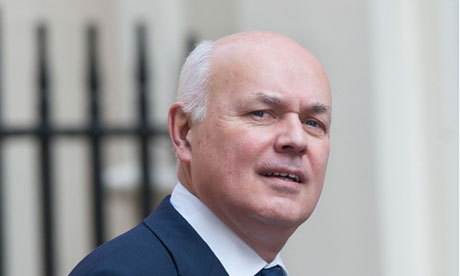
Iain Duncan Smith told he would not legally be able to introduce secondary legislation to make changes, DWP documents show

Iain Duncan Smith cannot issue a
ministerial order to make those who have been found unfit for work to look for,
or take up work, says the paper. Photograph: Rex Features
Iain Duncan
Smith is examining how to make it harder for sick and disabled people to
claim benefits, according to
leaked documents from the Department of Work and Pensions.
The documents show civil
servants advised the work and pensions secretary that he would not legally be
able to introduce secondary
legislation – which does not need a parliamentary vote – in order to give
jobcentre staff more powers to make employment and support allowance (ESA)
claimants undergo further tasks to prove they are trying as hard as possible to
get back into work.
The revelation comes as the DWP told the Guardian it had indefinitely postponed a week-long staff "celebration" of a new, tougher sanctions regime for more than a million job seekers.
In a separate memo also leaked to the Guardian, staff and organisations involved in delivering the failing Work Programme, were due to start "conditionality week" on Monday. The event, according to the memo , is "about celebrating how far we have come since new tougher sanction levels were introduced last year ... and about helping us smooth the way for universal credit, working better together and making sure we apply the rules consistently and fairly".
Mark Serwotka, the general secretary of the PCS union, which represents thousands of DWP staff, said: "It is distasteful in the extreme and grossly offensive that the DWP would even consider talking about celebrating cutting people's benefits."
In the seven pages of frank official advice dated 29 August, civil servants admit that reforms to the old incapacity benefits system had delivered some gains but there were still "several significant problems".
They say that still only half of claimants on the newly introduced category of ESA work-related activity group (WRAG) were coming off the benefit by three years.
The DWP says hundreds of
millions of pounds are being tied up in administration of the benefit including
the work capability assessments and appeals process. The document admits that ESA
changes were attracting a lot of negative attention.
The document warns Duncan Smith that he cannot simply issue a ministerial order to make those who have been found unfit for work to look for, or take up work. Fresh primary legislation would be needed, but he fears parliament does not have time for that process before the 2015 general election.
Part of the solution to getting the temporarily sick back into work lies with employers doing their bit to retain sick staff, the document says, but it acknowledges that envisaged ESA reform is unlikely to achieve this goal.
"The short answer therefore is that there is nothing we can do with secondary legislation to increase conditionality requirements on an ESA WRAG claimant," the document says.
Paul Farmer, the chief executive of the mental health charity Mind, said: "As people with mental health problems continue to struggle to access the support they need, the repeated response from the government is to crank up the pressure and potential punishments for those being supported by benefits.
"People with mental health problems face significant barriers to finding and staying in work. The government should be ensuring that people are supported to overcome these barriers rather than threatening people with a loss of income. This pressure often exacerbates people's mental health problems and pushes them further from work rather than closer to it."
The DWP said it would not comment on leaks. "Officials give advice to ministers all the time – some of which is acted upon, and some of which isn't," a spokesperson said. "It is only right that benefits come with conditions to ensure that people do all they can to move off benefits and into work if they are able.
"Our primary aim is to help people into jobs, while supporting those who are too ill to work, so it is important that staff and external providers are able to share best practice and ensure rules are applied consistently and fairly."
Guardian